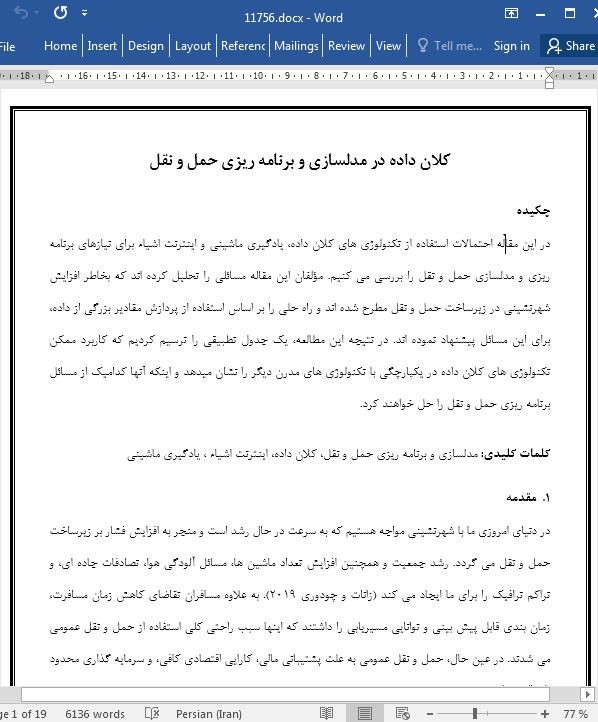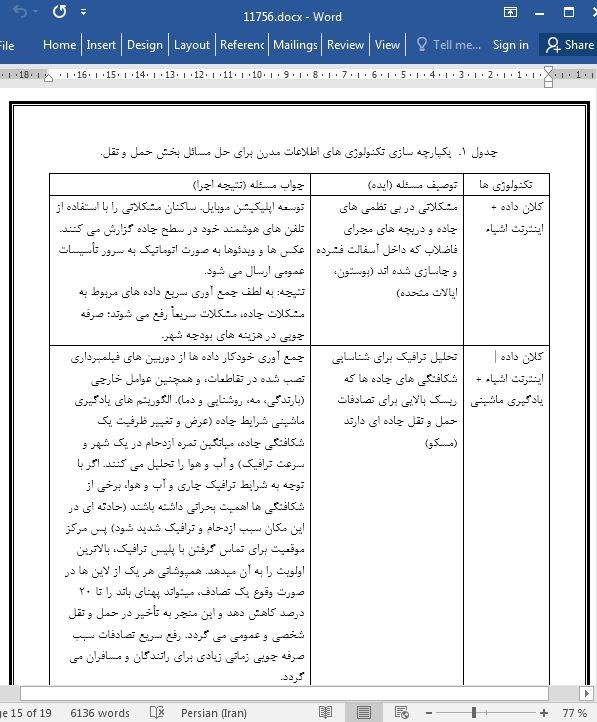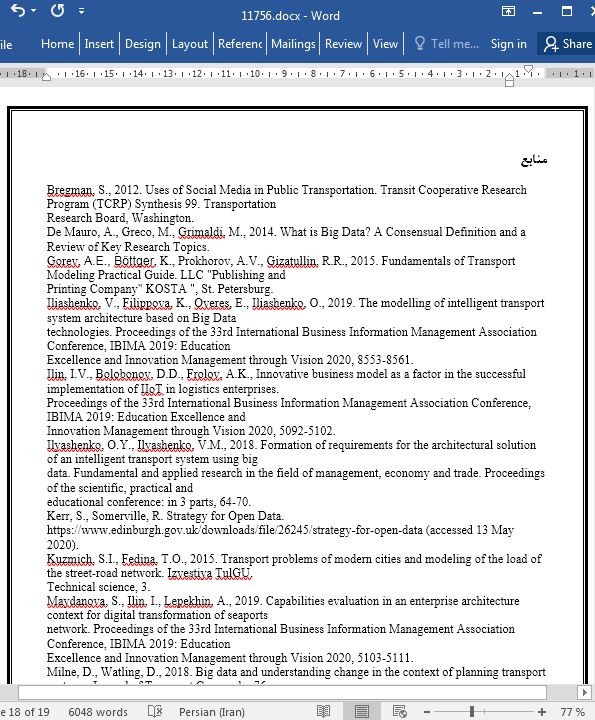
کلان داده در مدلسازی و برنامه ریزی حمل و نقل
چکیده
در این مقاله احتمالات استفاده از تکنولوژی های کلان داده، یادگیری ماشینی و اینترنت اشیاء برای نیازهای برنامه ریزی و مدلسازی حمل و نقل را بررسی می کنیم. مؤلفان این مقاله مسائلی را تحلیل کرده اند که بخاطر افزایش شهرنشینی در زیرساخت حمل و نقل مطرح شده اند و راه حلی را بر اساس استفاده از پردازش مقادیر بزرگی از داده، برای این مسائل پیشنهاد نموده اند. در نتیجه این مطالعه، یک جدول تطبیقی را ترسیم کردیم که کاربرد ممکن تکنولوژی های کلان داده در یکپارچگی با تکنولوژی های مدرن دیگر را نشان میدهد و اینکه آنها کدامیک از مسائل برنامه ریزی حمل و نقل را حل خواهند کرد.
1. مقدمه
در دنیای امروزی ما با شهرنشینی مواجه هستیم که به سرعت در حال رشد است و منجر به افزایش فشار بر زیرساخت حمل و نقل می گردد. رشد جمعیت و همچنین افزایش تعداد ماشین ها، مسائل آلودگی هوا، تصادفات جاده ای، و تراکم ترافیک را برای ما ایجاد می کند (زانات و چودوری 2019). به علاوه مسافران تقاضای کاهش زمان مسافرت، زمان بندی قابل پیش بینی و توانایی مسیریابی را داشتند که اینها سبب راحتی کلی استفاده از حمل و نقل عمومی می شدند. در عین حال، حمل و نقل عمومی به علت پشتیبانی مالی، کارایی اقتصادی کافی، و سرمایه گذاری محدود با چالش های متعددی رو به رو می شود.
9. نتیجه گیری
تکنولوژی تحلیل کلان داده در بخش حمل و نقل، شناسایی اهداف اصلی یک شرکت حمل و نقل را ممکن ساخته است، و این اهداف باید محقق شوند تا کارایی آن بهبود یابد:
• افزایش استفاده از خودروها
• کاهش هزینه های عملیاتی شرکت یا هزینه های انجام یک سفارش حمل و نقل
• کاهش مصرف سوخت
• اجتناب از تأخیرات در اجرای سفارشات برای حمل و نقل
Abstract
This article is built on the exploration of the possibilities of using Big Data, Machine Learning and the Internet of Things technologies for the needs of transport planning and modeling. The authors analyze the problems arising in the transport infrastructure because of the growing urbanization of cities and propose a solution to the problems based on the use of processing large amounts of data. As a result of the study, a comparative table was created showing the possible application of Big Data technologies in integration with other modern technologies and what problems of transport planning they will solve.
1. Introduction
In today’s world, we are facing rapidly growing urbanization resulting in increasing stress on transportation infrastructure. The population growth as well as increased quantity of vehicles brings us to the problems of air pollution, road accidents and traffic congestions (Zannat and Choudhury, 2019). Moreover, passengers demand decreased travel time, predictable schedule and tracking ability, which result in overall comfortability of public transport usage. At the same time, public transportation faces several challenges due to financial support, adequate economic efficiency and limited investments.
9. Conclusion
Analysis of Big Data technology in the transport sector made it possible to identify the main goals of a transport company that need to be achieved to improve its efficiency:
increased use of vehicles,
reducing the company's operating costs or the cost of fulfilling a transportation order,
reduced fuel consumption,
avoiding delays in the execution of orders for transportation.
چکیده
1. مقدمه
2. نیازهای برنامه ریزی و مدلسازی حمل و نقل
3. مسائلی در مدلسازی و برنامه ریزی حمل و نقل
4. کلان داده
5. مفهوم جاده های هوشمند
6. مسائل کلیدی حوزه حمل و نقل که با استفاده از تکنولوژی کلان داده حل شدند
7. تحلیل یکپارچه سازی کلان داده با تکنولوژی های مدرن دیگر
8. بحث
9. نتیجه گیری
منابع
Abstract
1. Introduction
2. Transport Planning and Modelling Needs
3. Problems in Transport Modeling and Planning
4. Big Data
5. «Smart Roads» Concept
6. Key Problems of the Transport Area Solved Using Big Data Technology
7. Analysis of the Big Data Integration with Other Modern Technologies
8. Discussion
9. Conclusion
References
- اصل مقاله انگلیسی با فرمت ورد (word) با قابلیت ویرایش
- ترجمه فارسی مقاله با فرمت ورد (word) با قابلیت ویرایش، بدون آرم سایت ای ترجمه
- ترجمه فارسی مقاله با فرمت pdf، بدون آرم سایت ای ترجمه



